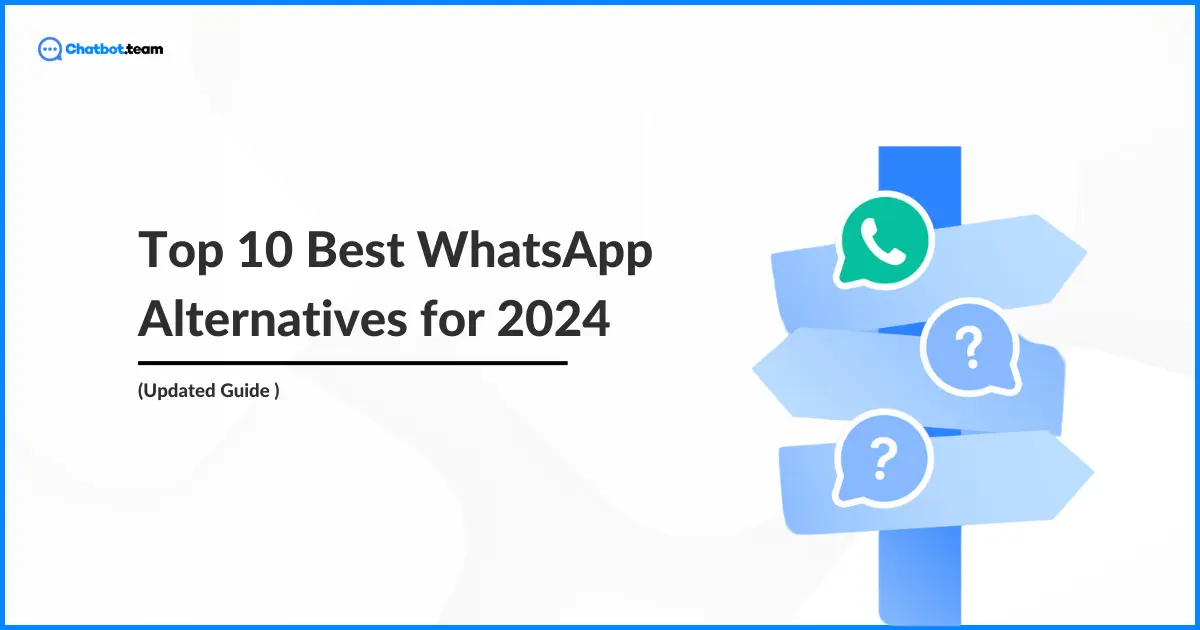WhatsApp has become a household name, with over 2 billion users worldwide. It’s fast, easy to use, and packed with features like voice/video calls, group chats, and end-to-end encryption. But in recent years, many users have started looking for alternatives. Why? Privacy concerns, data-sharing policies, and the need for more advanced or business-friendly features have pushed people to explore better options.
Whether you’re concerned about data security, need an app with more customization, or just want something different, there are plenty of powerful alternatives to WhatsApp in 2025. From highly secure messaging platforms to apps with advanced productivity tools, you have choices that cater to personal and professional needs.
In this guide, we’ll walk you through the best WhatsApp alternatives available today—helping you find the right app that fits your needs perfectly. Let’s dive in!
Why is WhatsApp So Popular?
WhatsApp has dominated the messaging app space for years, and its massive success isn’t just by chance. The app offers a seamless, user-friendly experience, making it accessible to everyone—from tech-savvy users to those who prefer simplicity. With an intuitive interface and effortless navigation, WhatsApp has broken barriers across age groups, cultures, and languages.
One of its biggest strengths is end-to-end encryption, ensuring that messages, calls, and shared media remain private between the sender and receiver. In a world where data privacy is a major concern, this security feature has solidified WhatsApp as a trusted platform.
Another reason for its global appeal is cross-platform compatibility. Whether you’re using Android, iPhone, or even a desktop, WhatsApp ensures uninterrupted communication across devices. This flexibility makes it perfect for both personal and professional use.
But what truly sets WhatsApp apart is its cost-effectiveness. Unlike traditional SMS and international calling services, WhatsApp allows free messaging, voice, and video calls as long as you have an internet connection. This has been a game-changer, particularly in regions where mobile data costs are high. Moreover, WhatsApp isn’t just about texting—it’s a feature-rich platform. From group chats for families and teams to WhatsApp Business for companies engaging with customers, the app has evolved to meet different communication needs. Add in status updates, media sharing, and interactive tools, and it’s easy to see why WhatsApp remains a top choice worldwide.
With its mix of security, affordability, ease of use, and powerful features, WhatsApp continues to be the go-to messaging app for billions.
List of 10 Best WhatsApp Alternatives in 2025
As privacy concerns and security issues continue to rise, many users are searching for WhatsApp alternatives that offer better encryption, more features, and greater control over their data. Whether you need an app for secure personal messaging, professional collaboration, or enhanced group communication, there are plenty of options available.
In this guide, we’ve compiled the top 10 WhatsApp alternatives in 2025 that provide privacy-first messaging, seamless connectivity, and unique features to match different user needs.
Looking for more WhatsApp insights? Check out our blogs on WhatsApp Business API and WhatsApp Auto-Reply for business-friendly solutions.
1. Facebook Messenger – Best for Social Networking
Facebook Messenger is perfect for those who want a socially connected messaging experience. With seamless integration into Facebook, it allows instant text chats, voice and video calls, group conversations, and business interactions.
Pros:
- Voice & video calls with HD quality
- Interactive chat features like GIFs, stickers, and reactions
- Secret Conversations for end-to-end encrypted messaging
Cons:
- Requires a Facebook account
- Privacy concerns due to Facebook’s data policies
2. Signal – Best for Privacy & Security
Signal is the go-to choice for privacy-focused users. It offers end-to-end encryption, ensuring that only the sender and receiver can access messages. Plus, it’s ad-free and open-source, making it one of the most transparent messaging platforms.
Pros:
- Self-destructing messages for extra privacy
- No data tracking – Signal doesn’t collect user information
- Edit messages up to 10 times within 24 hours
Cons:
- No cloud backup, meaning data cannot be restored
- Not ideal for business or large-group collaboration
3. Slack – Best for Workplace Communication
Slack is designed for professional teams and business collaboration. It organizes conversations into channels for structured discussions and supports file sharing, integrations, and task management tools.
Pros:
- Integrates with 1000+ business tools (Google Drive, Trello, etc.)
- Searchable message history
- Custom workflows & notifications
Cons:
- The free version has limited features
- May feel overwhelming for casual users
4. Telegram – Best for Large Groups & Cloud Storage
Telegram is a fast, cloud-based messaging app that supports large groups (up to 200,000 members), file sharing (up to 2GB), and self-destructing messages.
Pros:
- Multi-device support
- Highly customizable bots & automation
- Secure secret chats with encryption
Cons:
- Group chats lack full end-to-end encryption
- Not as privacy-focused as Signal
5. Kik – Best for Social Anonymity
Kik is a unique messaging app that doesn’t require a phone number for sign-up, making it ideal for anonymous messaging and meeting new people in public chat rooms.
Pros:
- No phone number is required for registration
- Engaging in chat rooms & group discussions
- In-app games & multimedia sharing
Cons:
- Privacy concerns due to anonymous user sign-ups
- Limited features compared to WhatsApp & Telegram
6. Skype – Best for Video Calling
Skype remains a top choice for high-quality video calls and international communication, making it great for both personal and professional use.
Pros:
- Crystal-clear voice & video calls
- Screen sharing & meeting tools
- Works across all major platforms
Cons:
- Requires a Microsoft account
- Paid plans needed for international calling
7. Viber – Best for Multi-Device Support & International Calls
Viber offers end-to-end encryption, multi-device synchronization, and affordable international calling options.
Pros:
- Sync messages across devices
- Backup chats to Google Drive
- Secure hidden chats & disappearing messages
Cons:
- Consumes more device storage & battery
- Not as widely used as WhatsApp or Telegram
8. WeChat – Best All-in-One Super App
WeChat is more than a messaging app—it’s a social media platform, payment gateway, and mini-app ecosystem used by over a billion people worldwide.
Pros:
- Messaging, payments, and social media in one app
- WeChat Pay for online transactions
- Mini-programs for booking taxis, shopping, and more
Cons:
- Primarily used in China (limited global availability)
- Privacy concerns over data tracking
9. Snapchat – Best for Fun & Temporary Messaging
Snapchat is perfect for disappearing messages, creative multimedia, and augmented reality features.
Pros:
- Auto-delete messages after viewing
- AR filters & fun interactive elements
- Discover content from influencers & brands
Cons:
- Low video call quality
- Not suitable for professional use
10. Discord – Best for Online Communities & Gaming
Originally built for gamers, Discord is now a powerful community-based platform that supports voice, video, and text communication.
Pros:
- Customizable servers & channels
- Integrated with gaming & productivity tools
- Live streaming & screen sharing
Cons:
- The steeper learning curve for beginners
- Not ideal for one-on-one private messaging
Which is the Best WhatsApp Alternative?
The best WhatsApp alternative depends on your needs. If privacy is your top priority, Signal is the best choice with its end-to-end encryption and zero data tracking. For feature-rich messaging and large group chats, Telegram stands out. If you need workplace collaboration, Slack is the best option with seamless integrations. For fun social messaging, Snapchat and Kik offer unique features. If high-quality video calls matter most, Skype and Viber are top picks. Each app serves a different purpose, so the best alternative ultimately depends on your preferences!
Conclusion
In today’s fast-paced digital world, choosing the right messaging app is more important than ever. While WhatsApp remains a dominant player, many users are seeking better privacy, advanced features, or business-friendly solutions. Whether you prioritize top-tier security with Signal, large group interactions on Telegram, workplace collaboration with Slack, or social engagement through WeChat and Snapchat, there’s a perfect alternative to match your needs.
By exploring these WhatsApp alternatives, you can find an app that aligns with your privacy concerns, communication preferences, and overall user experience. The key is to choose a platform that offers the right balance of security, functionality, and ease of use.
Which WhatsApp alternative is best for you? Try a few and discover the one that fits your lifestyle!
Frequently Asked Questions
The best alternative to WhatsApp largely depends on your needs. If privacy is your top concern, Signal is often considered the best alternative due to its strong encryption and open-source nature. For workplace collaboration, Slack might be the best choice, offering organized communication channels and integrations with productivity tools. If you're looking for a feature-rich messaging app similar to WhatsApp, Telegram is a strong contender with its large group chat support and cloud-based storage.
Signal is widely considered safer than WhatsApp due to its commitment to privacy and security. Signal offers end-to-end encryption for all communications and doesn’t store user data on its servers. Additionally, Signal is open-source, meaning its code is available for public scrutiny, which builds trust among privacy-conscious users.
In India, WhatsApp remains the most popular messaging app, but alternatives like Telegram and Signal are also widely used. Telegram is particularly popular for its large group chat capabilities and media sharing, while Signal is gaining traction among those who prioritize privacy. Local apps like Hike were once popular but have since shifted focus to other services.
In China, WeChat is the dominant messaging app, serving as a comprehensive platform for communication, social networking, and mobile payments. It’s more than just a messaging app, as it integrates a wide range of services, from booking taxis to paying bills, making it an essential part of daily life in China.
Telegram is often considered the closest alternative to WhatsApp in terms of features. Like WhatsApp, Telegram offers text messaging, voice and video calls, and media sharing, but it also includes additional features like large group chats, bots, and the ability to send files up to 2GB. Telegram’s cloud-based nature allows for seamless access across multiple devices.
Yes, Signal is considered a safer alternative to WhatsApp. It provides end-to-end encryption for all communications and does not collect or store user data. Signal’s open-source code allows for transparency, and it is free from ads and tracking, making it a top choice for users concerned about privacy.
There are several apps similar to WhatsApp that offer comparable messaging, calling, and media sharing features. Telegram, Signal, and Viber are among the closest alternatives, each with its own strengths. Telegram offers a more customizable experience, Signal is focused on privacy, and Viber combines messaging with secure voice and video calls. Each app provides a similar experience to WhatsApp but with unique features that might better meet your specific needs.


